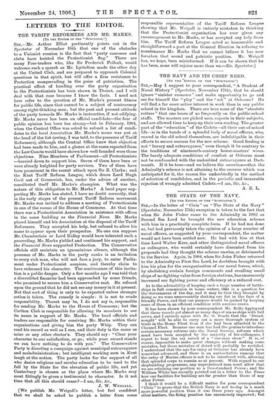LETTERS TO. TIIE EDITOR.
THE TARIFF REFORMERS AND MR. MARKS.
[To THE EDITOR OF THE "SPECTATOR."' SIE,-Mr. Arthur Elliot pertinently points out in the Spectator of November 10th that one of the obstacles to a Unionist reunion is the fact that "party caucuses and clubs have hoisted the Protectionist flag." There are many Free-traders who, like Sir Frederick Pollock, would welcome such a speech as Mr. Lyttelton made the other day at the United Club, and are prepared to approach Colonial questions in that spirit, but will offer a firm resistance to Protection masquerading in the guise of patriotism. The practical effect of banding over the party organisation to the Protectionists has been shown in Thanet, and I will deal with that case because I know the facts. I need not here refer to the question of Mr. Marks's present fitness for public life, since that cannot be a subject of controversy among right-thinking men; but the past and present attitude of the party towards Mr. Marks is instructive, if not edifying. Mr. Marks never has been an official candidate—the fear of public opinion his been too strong—but in February, 1904, when the Central Office was asked to submit a list of candi- dates to the local Association Mr. Marks's name was put at the head of the list (owing, I was told, to the pressure of Tariff Reformers), although the Central Office knew that objection had been made to him, and a glance at the cases reported from the Law Courts would have shown how well founded were those objections. Nine Members of Parliament—all Protectionists —hurried down to support him. Seven of them have been or were already knighted for party services. Two of them have been prominent in the recent attack upon Sir E. Clarke ; and the Kent Tariff Reform League, which drove Lord Hugh Cecil out of Greenwich, has, under the advice of another, constituted itself Mr. Marks's champion. What was the nature of this obligation to Mr. Marks ? A local paper sup- porting Mr. Marks has stated, I have no doubt correctly, that in the early stages of the present Tariff Reform movement Mr. Marks was invited to address a meeting of Protectionists in one of the rooms of the House of Commons. At that time there was a Protectionist Association in existence with offices in the same building as the Financial News. Mr. Marks placed himself and his Association at the disposal of the Tariff Reformers. They accepted his help, but refused to allow his name to appear upon their prospectus. No one can suppose Mr. Chamberlain or Lord Ridley would have tolerated such a proceeding. Mr. Marks yielded and continued his support, and the Financial News supported Protection. The Conservative officials still maintain an ignominious silence, although the presence of Mr. Marks in the party ranks is an invitation to every rich man, who will not face a jury, to enter Parlia- ment under Protectionist auspices, and thereby claim to have redeemed his character. The continuance of this invita- tion is a public danger. Only a few months ago I was told that a discredited financier had been approached by some friends, who promised to secure him a Conservative seat. He refused upon the ground that he did not see any money in it at present. But that sort of thing is only to be expected unless stronger action is taken. The remedy is simple : it is not to evade responsibility. Thanet may be, I do not say is, responsible for sending Mr. Marks to the House of Commons ; but the Carlton Club is responsible for allowing its members to use its name in support of Mr. Marks. The bead officials and leaders are responsible for receiving Mr. Marks within their organisations and giving him the party Whip. They can read his record as well as I can, and their duty is the same as mine or any other elector's. They should say : "Clear your character to our satisfaction, or go ; while your record stands we can have nothing to do with you." The Conservative Party is directing a campaign against municipal extravagance and maladministration ; but intelligent working men in Kent laugh at the notion. The party looks for the support of all who desire religious and secular education to be used to the full by the State for the elevation of public life, and yet Canterbury is chosen as the place where Mr. Marks may most fittingly be given a testimonial to character. Is it not time that all this should cease P—I am, Sir, &c., J. W. WEIGALL.
[We publish Mr. Weigall's letter, but feel confident that we shall be asked to publish a letter from some responsible representative of the Tariff Reform League showing that Mr. Weigall is entirely mistaken in thinking that the Protectionist organisation has ever given any encouragement to Mr. Marks, or has accepted any help from him. The Tariff Reform League acted so honourable and straightforward a part at the General Election in refusing to countenance Mr. Marks that we cannot believe it has now forsaken that sound and patriotic position. Mr. Weigall has, we hope, been misinformed. If it can be shown that he has been, none will rejoice more than we.—ED. Spectator.]














































 Previous page
Previous page